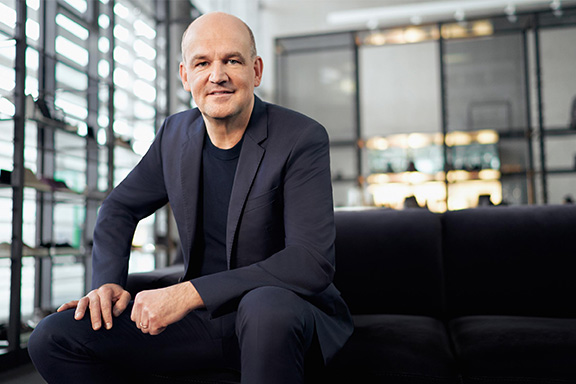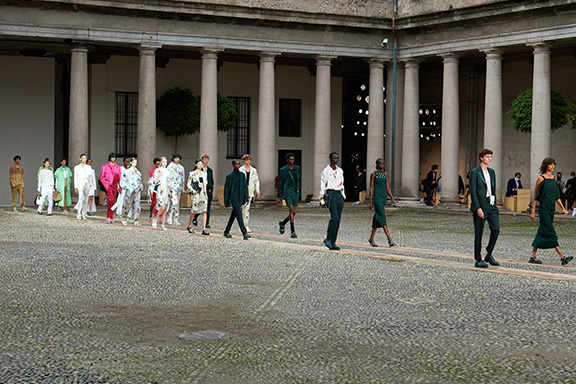Comparison of actual and forecast business performance
- Business performance in 2020 severely impacted by COVID-19 pandemic
- Significant decline in sales and operating profit (EBIT)
- Strong momentum in Online and in mainland China continues
After a very encouraging start to fiscal year 2020, the rapid spread of COVID-19 led to a significant impact on the global business of HUGO BOSS. In particular, widespread temporary store closures in light of global lockdowns, large-scale restrictions on public life including extensive social distancing measures, and international travel restrictions put a significant strain on sales, operating result (EBIT) and free cash flow. The implications of the pandemic became particularly evident in Europe, by far the Group’s largest region, and the Americas. In Asia, however, the swift recovery of business in mainland China compensated for some of the declines in the region’s other markets.
Despite the noticeable negative impact of the pandemic on its business, in 2020 HUGO BOSS continued to make significant progress with its strategic growth drivers Online and China. With a currency-adjusted sales increase of 49%, the Company’s own online business performed particularly well, posting significant double-digit growth for the third year in a row. This was supported by sales generated via hugoboss.com as well as by self-managed offerings on key partner websites in the concession model, each posting significant double-digit growth in 2020. Sales in mainland China, on the other hand, were able to return to strong double-digit growth as early as during the second quarter, after having been severely impacted in the first quarter. Overall, currency-adjusted sales in mainland China grew 5% in full year 2020. From a brand perspective, further increasing the desirability of BOSS and HUGO was a clear focus of all of the Company’s initiatives in 2020. Thanks to a variety of digital events, exclusive collaborations with brands and ambassadors and a strong focus on casualwear, the attractiveness of both brands was further enhanced. At the same time, HUGO BOSS succeeded in further improving the efficiency and flexibility of its operational processes in 2020 – largely reflecting its consistent focus on driving digitization across the entire value chain. Group Strategy
Thanks to its healthy balance sheet structure, HUGO BOSS was well prepared for the financial challenges associated with the pandemic. In this context, at an early stage of the pandemic, the Company has initiated and successfully executed comprehensive measures with a total volume of at least EUR 600 million aimed at protecting cash flow. In particular, the Company significantly reduced its operating expenses, postponed non-business-critical investments, significantly reduced the merchandise inflow and suspended the dividend payment for fiscal year 2019, with the exception of the legal minimum dividend of EUR 0.04 per share. Furthermore, the Company secured further credit commitments in 2020 and successfully exercised the option to increase its revolving syndicated loan, thereby further strengthening its financial flexibility during the course of the year. Earnings Development, Profit and Loss Statement, Financial Position, Statement of Cash Flow and Free Cash Flow
In the wake of the COVID-19 pandemic, on March 18, 2020, HUGO BOSS had withdrawn its initial outlook for fiscal year 2020 as provided in the 2019 Annual Report. Due to the high level of uncertainty regarding the further development of the pandemic, the Group was not able to provide a new, reliable forecast for its key performance indicators in the remainder of fiscal year 2020.
|
|
Result 2019 |
|
Outlook 20201 |
|
Result 2020 |
||||||||||
|---|---|---|---|---|---|---|---|---|---|---|---|---|---|---|---|---|
Group sales |
|
EUR 2,884 million |
|
Development within a range of 0% to +2%2 |
|
Decrease by 31%2 to EUR 1,946 million |
||||||||||
Operating result (EBIT) |
|
EUR 344 million |
|
EUR 320 million to EUR 350 million |
|
EUR (236) million3 |
||||||||||
Group’s net income |
|
EUR 205 million |
|
Increase of up to 10% |
|
EUR (219) million4 |
||||||||||
Trade net working capital (TNWC) as a percentage of sales |
|
20.1% |
|
Increase by around 50 basis points |
|
Increase by 860 basis points to 28.7% |
||||||||||
Capital expenditure |
|
EUR 192 million |
|
EUR 140 million to EUR 160 million |
|
EUR 80 million |
||||||||||
|
||||||||||||||||
Overall, currency-adjusted Group sales decreased by 31% in 2020. This corresponds to a sales decline in Group currency of 33% to EUR 1,946 million. While the sales decrease in own retail was slightly lower than in wholesale, both distribution channels were significantly affected by temporary store closures in the wake of the lockdowns. On average, around 20% of the Company’s own BOSS and HUGO stores globally were closed in 2020. In addition, large-scale restrictions on public life in many markets and far-reaching international travel restrictions had a significant negative impact on sales development. Earnings Development, Sales Performance
In addition to the significant decline in sales, a lower gross margin reflecting increased markdown activity, also weighed on operating result (EBIT). While EBIT in fiscal year 2020 totaled minus EUR 236 million (2019: plus EUR 344 million), this also reflects non-cash impairments of non-current assets in the amount of EUR 110 million (2019: EUR 10 million). These were directly related to the negative implications of the pandemic on the Group’s retail business, primarily reflecting impairments of fixed store assets in the amount of EUR 69 million and right-of-use assets in the amount of EUR 37 million. Excluding those impairment charges, EBIT amounted to minus EUR 126 million (2019 excluding impairment charges: plus EUR 355 million). The comprehensive expense-reduction measures implemented by HUGO BOSS at an early stage of the pandemic partially compensated for the decline in EBIT. The Group’s net income amounted to minus EUR 219 million in fiscal year 2020 (2019: plus EUR 205 million). Excluding the impairment charges, net income amounted to minus EUR 131 million (2019 excluding impairment charges: plus EUR 212 million). Earnings Development, Income Statement
The moving average of trade net working capital (TNWC) as a percentage of sales on the basis of the last four quarters increased to 28.7% (2019: 20.1%), primarily reflecting the decline in Group sales While inventories at the end of the year were only slightly above the prior-year level, trade receivables declined noticeably, reflecting lower sales in the wholesale business. Net assets
At EUR 80 million, capital expenditure came in well below the prior-year level (2019: EUR 192 million), reflecting the reduction of the investment budget as part of the Company’s measures to secure cash flow. In 2020, investing activity was focused on optimizing and modernizing the own store network, the global expansion of the Company’s own online business as well as the Group’s IT infrastructure. Financial Position, Capital Expenditure


